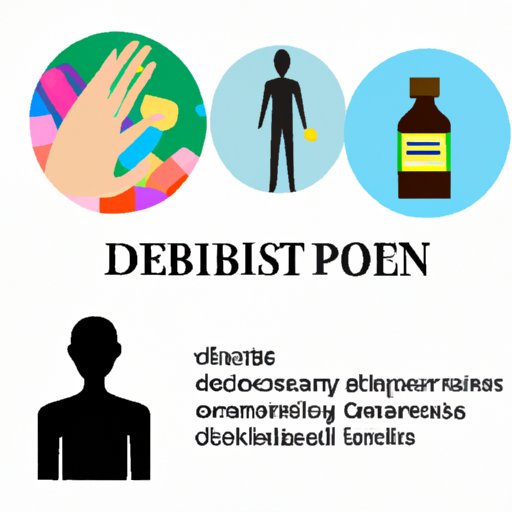Introduction
Substance abuse is a serious problem that affects millions of people across the world. It is defined as the misuse of drugs or alcohol to alter one’s mood or behavior. Mental health disorders refer to a wide range of psychological issues, such as depression, anxiety, or bipolar disorder, that can cause distress and disrupt someone’s daily functioning. While the two may seem unrelated, there is a strong connection between substance abuse and mental health.
Exploring the Link Between Substance Abuse and Mental Health Disorders
Research shows that nearly half of all individuals with a mental health disorder also struggle with substance abuse. This is known as a co-occurring disorder, and it is estimated that 7.9 million adults in the United States suffer from it. People who have a co-occurring disorder are more likely to experience severe symptoms than those who only have one condition.
There are several risk factors associated with developing a co-occurring disorder, such as genetics, family history, trauma, and environmental stressors. People who have a family history of mental illness or substance abuse are more likely to develop a co-occurring disorder. Additionally, those who have experienced trauma or stressful life events are at an increased risk of developing a mental health disorder and then turning to substance abuse as a way to cope.
Examining How Substance Abuse Impacts Mental Health
When someone is struggling with both a mental health disorder and substance abuse, the two conditions can feed off of each other and worsen their symptoms. Substance abuse can interfere with treatment for mental health disorders, making it difficult to manage symptoms and leading to further complications. It can also exacerbate existing symptoms, such as increasing feelings of depression or anxiety.
Additionally, substance abuse can lead to the development of further mental health disorders. For example, long-term alcohol abuse has been linked to the development of depression and anxiety. The use of certain drugs can also contribute to the onset of psychotic episodes or paranoia.
Understanding the Connection Between Mental Illness and Substance Abuse
The link between mental illness and substance abuse is complex, and there are many factors that contribute to the development of a co-occurring disorder. One of the most common explanations is the concept of self-medication. People who are struggling with mental health issues may turn to drugs or alcohol as a way to cope with their symptoms and escape their reality.
Another factor is the cycle of addiction. Substance abuse can quickly become a habit, and over time it can become a full-blown addiction. When someone is caught in the cycle of addiction, they are more likely to develop further mental health issues due to the physical and psychological effects of the substance.

The Impact of Substance Abuse on Mental Health
Substance abuse can have a profound impact on someone’s mental health. Those who are struggling with addiction are more likely to experience symptoms of anxiety and depression. They may also have difficulty concentrating, which can lead to cognitive issues.
In addition, substance abuse can lead to social isolation. People who are addicted to drugs or alcohol may find it difficult to maintain relationships, and they may start to withdraw from activities and their social circle. This can further worsen their mental health.

Treatment Options for Substance Abuse and Mental Health
Treating a co-occurring disorder requires a comprehensive approach. Traditional treatment methods typically involve medication, therapy, and lifestyle changes. Medication can help manage symptoms of mental health disorders, while therapy can help address the underlying causes. Lifestyle changes can include things like getting regular exercise, eating healthy, and avoiding triggers that can lead to substance abuse.
In addition to traditional methods, there are also holistic options for treating a co-occurring disorder. These include alternative therapies such as yoga, meditation, and acupuncture. Holistic approaches can be beneficial for those who want to focus on treating the mind, body, and spirit as a whole.

Addressing Substance Abuse as a Mental Health Disorder
It is important to recognize substance abuse as a mental health disorder in order to effectively treat it. Seeking professional help is essential for those who are struggling with addiction. A therapist or counselor can provide support and guidance throughout the recovery process. Additionally, it is beneficial to utilize support systems such as 12-step programs, which can provide a sense of community and accountability.
It is also important to practice self-care when addressing substance abuse as a mental health disorder. Self-care involves taking time for yourself, engaging in activities that bring joy, and practicing mindfulness. Taking care of your physical and mental health can go a long way in helping to manage symptoms of addiction and mental illness.
Conclusion
Substance abuse and mental health disorders often go hand in hand, and it is important to understand the connection between the two. Substance abuse can interfere with treatment for mental health disorders and exacerbate symptoms. Treatment for a co-occurring disorder should involve a comprehensive approach, including traditional and holistic methods. Additionally, it is important to address substance abuse as a mental health disorder by seeking professional help and utilizing support systems. With the right treatment plan, those struggling with both conditions can achieve long-term recovery.
(Note: Is this article not meeting your expectations? Do you have knowledge or insights to share? Unlock new opportunities and expand your reach by joining our authors team. Click Registration to join us and share your expertise with our readers.)
